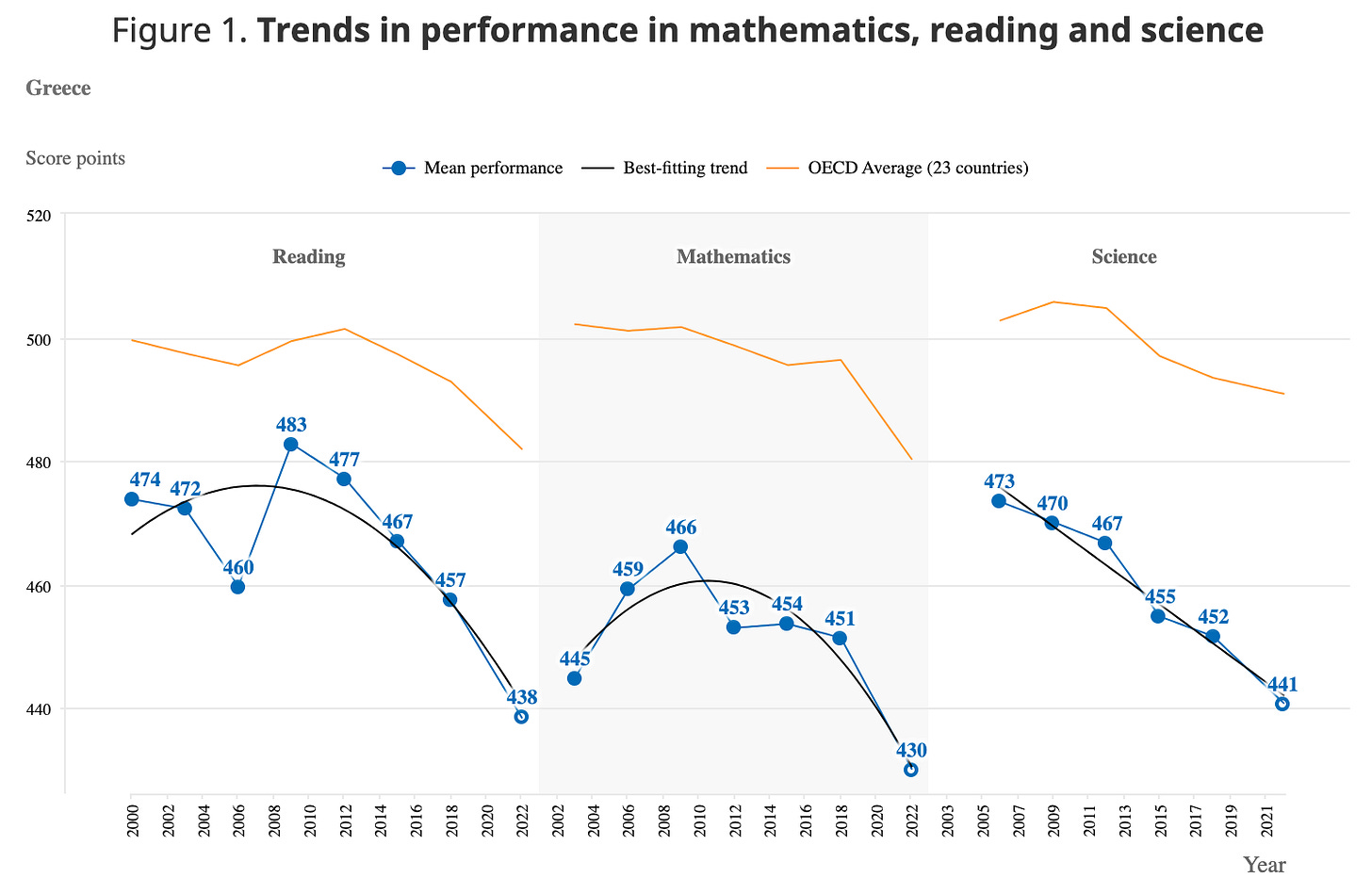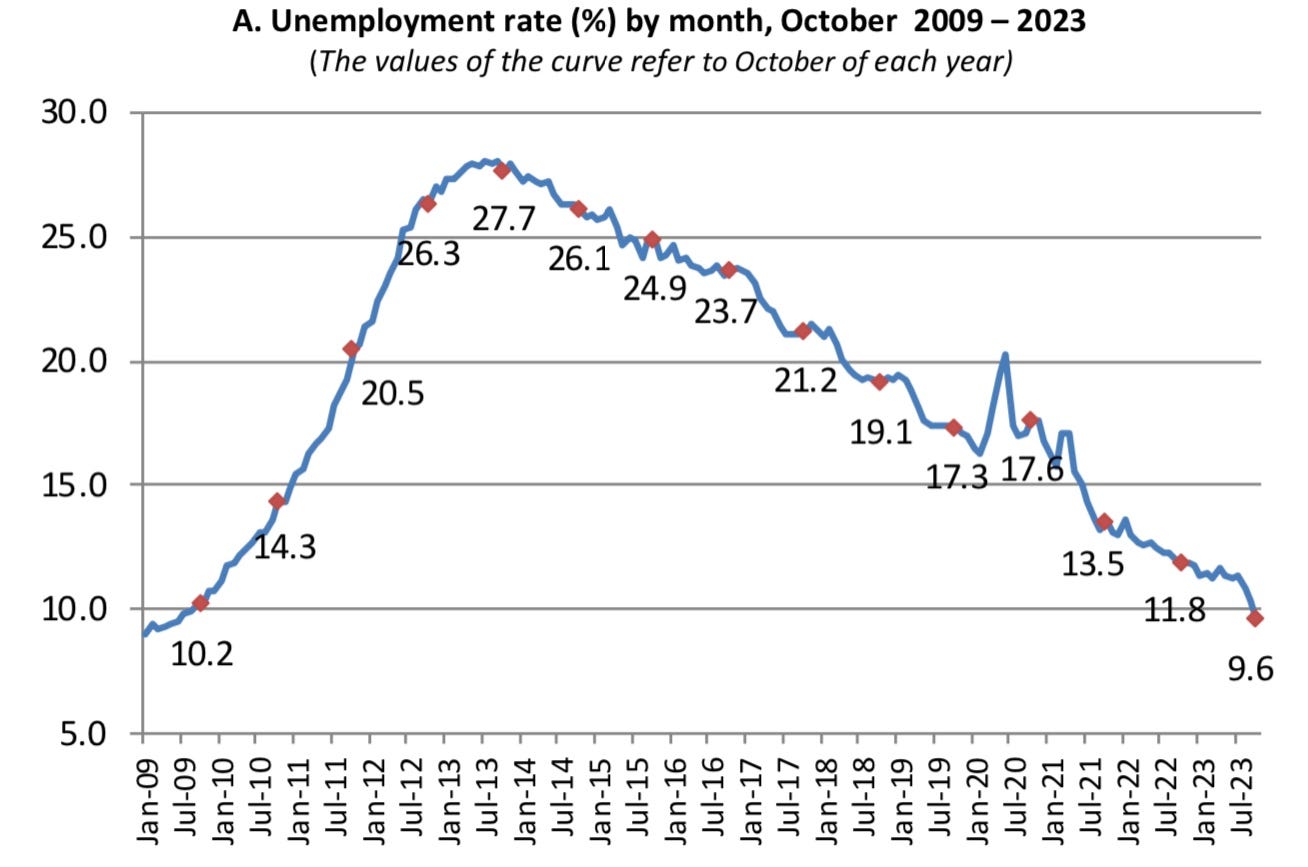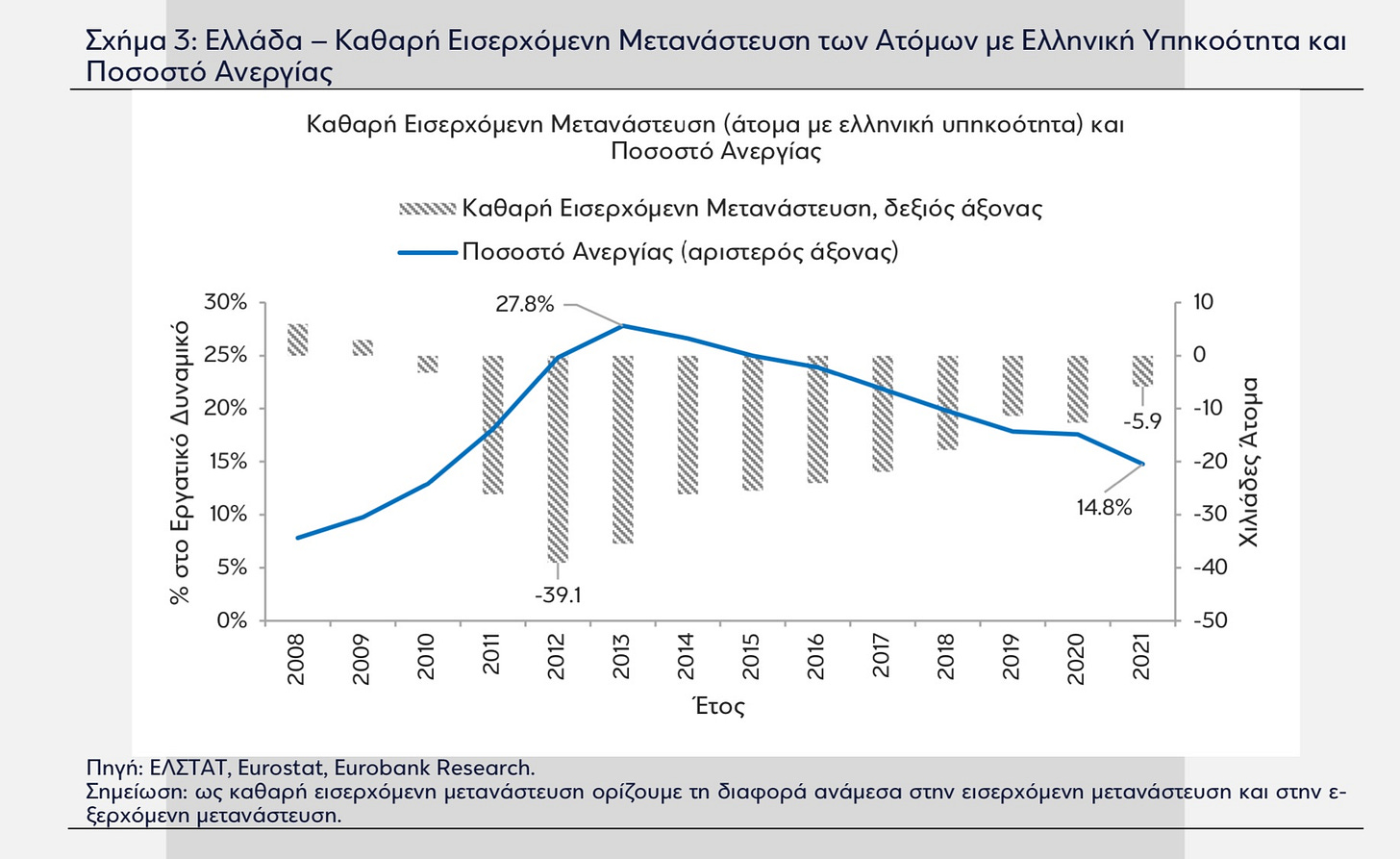Welcome to another issue of Changing Greece.
If you like what you are reading, consider joining 1,891 other readers eager to see and help Greece change by subscribing below:
Today, we are going to start by talking about… a half glass of ouzo!
🥃 Is the glass of ouzo half empty or half full?
Imagine it's a breezy summer afternoon. You are in a Greek restaurant. There is a glass of ouzo in front of you. It is filled up until the middle. Is the glass of ouzo half empty or half full?

This is a Greek adaptation of the classic philosophical question, where optimists typically answer “half full” and pessimists tend to say “half empty”. There is no right or wrong answer here. No perspective is more important than the other. One focuses on what has been fulfilled, the other on what is still missing. They are both necessary.
Imagine now that this glass of ouzo is actually Greece.
Greece — a perennial problem child or a newfound problem solver?
One way to look at Greece is by focusing on its many long-term problems that have not yet been solved (half-empty). This is a very common POV by Greeks, especially those that have experienced these problems upfront.
Another way to look at Greece is by focusing on the progress it has been making to solve some of its problems (half-full). This POV puts emphasis on the positive aspects of its transformation.
Both perspectives hold truth in them. And yet, neither alone is enough to take Greece forward. In order to help the country progress and take actionable steps into the future, we need to acknowledge the reality in both outlooks.
At the end of the day, we are still half-way through regardless of where we stand.
A unified framework of pushing for change in Greece
Both pessimists and optimists want a better future for Greece. But we need to move away from the spirals of negativity often cultivated by the constant cynics as well as the toxic positivity frequently promoted by whoever holds office.
We need to retain the good elements on both sides — e.g. a half-empty POV for Greece means we should always strive for more and never get complacent, whereas a half-full POV for Greece means we should take stock of what led to our achievements so that we can replicate them.
The ying is nothing without its yang. In order to affect change, we need to merge the two perspectives. Stay vigilant about our shortcomings but also acknowledge our successful efforts. Talk about all the areas that are still flawed as well as all the areas that have been improved.
Not every part of the equation that constitutes Greece holds equal weight and significance. And yet, we need the whole picture to have a deeply honest view and make comprehensive assessments. As Aristotle taught us, the whole is greater than the sum of its parts.
How does this look in practice
Let’s look at an example.
Below, I collected 10 interesting data points about Greece based on recent news, publications or reports all published over the past one month. Five were categorized as “glass half empty” the other five as “glass half full” types of information.
A glass of Greece half empty
Low performance in math, reading and science. The latest country scores from PISA for 2022 show that there is a serious problem with high-school education in Greece. Young Greek students are progressively scoring worse in key areas of knowledge according to PISA data since 2000, now falling far below the OECD average in math, reading and science.
High levels of inequality: While we have improved on some fronts, Greece still suffers from a number of economic and social inequalities. This recent study led by Nikos Vettas tries to provide comprehensive answers about to the types, sources and interconnections of inequality in Greece over the past two decades. A necessary read for all policymakers.
Low productivity. Greeks work some of the longest hours across Europe, and yet our labour productivity is abysmal. The authoritative Pissarides report (finally translated in English) sheds some light on the causes and consequences of the Greek economy's low productivity, among many other key areas that need work.
Low savings rate. While marginally increasing from 2021 to 2022, Greece had the worst gross savings rate (as % of GDP) among all EZ countries last year. This is a big problem. As pointed out in this Eurobank research report, a healthy savings rate is necessary to ensure a sustainable growth trajectory for an economy.
Demographic decline. Greece's population is declining fast, with many rural areas being deserted. This is a pressing problem with no quick fixes or easy solutions. It requires a multi-decade long level of planning and continuous execution that transcends ideologies and what party is in government. While both New Democracy and PASOK seem to understand the severity of continuous low birth rates for the long-term viability of the country, there is little sense of urgency or common path today on tackling this crucial issue.
A glass of Greece half full
Greece reaches single digit unemployment. For the first time since the crisis started 15 years ago, Greece has dropped below double digit unemployment, touching 9.7% in October 2023. To understand why this is such a significant moment for Greece, see here.
Youth unemployment falls below 3rd place for the first time in 13 years. The high level of unemployment among young Greeks is a key factor that pushed many of them to leave the country after the crisis started. Once topping the charts not just in Europe but also globally, Greek youth unemployment (19.3%) now fell to 8th place among EU Member States.
Greek GDP growth holds strong. Greece's GDP grew by 2.1% year-on-year in Q3 2023, which is the 5th fastest growth rate in the Eurozone. Eurobank projects the final number for the year to be around 2.0%, while Deutsche Bank believes it will be 1.2% next year. The European Commission is more optimistic, projecting 2.4% for 2023 and 2.3% for 2024.
Greece upgraded to investment grade by Fitch. Another stamp of approval by a top tier rating agency, following the decision of S&P in October to bump Greek debt to the same level. This is an important signal for many large institutional players who want to invest in the country and were either afraid or unable (by mandate) to do so until now.
Manufacturing PMI in Greece second best after India in November. Really strong performance by Greece, which holds well above EZ average since the start of 2023 and is projected to continue strong in 2024. As Yanos Kontopoulos (CEO of ATHEX) said last week, Greece seems to be putting the crisis behind it.
Conclusion
My hope is that when reading the above, you did not stop at either half.
One can have preferences (often by default) and certainly does not have to agree with all sides. But reading, internalizing and thinking about both perspectives, especially when they are equally backed with data, helps us come closer to a common truth.
Next time? You top that glass of Greece all the way up, and you drink it in full.
Changing Greece is hard. But no great feat worth doing is ever easy.
🙌 Greece is changing
Greece is introducing voting by mail. The new absentee ballot system will allow citizens living abroad (as well as those in remote Greek areas) to vote via post. The system will be tested for the first time in the 2024 European Parliament election. If successful, the government intends to implement it on national elections too.
According to Pew Research, most countries allow voters abroad to cast ballots in some shape or form. Out of 216 countries surveyed, 152 of them allow voting from abroad on national legislative, European Parliament or presidential elections. 40 of them used postal ballots in their most recent national election.
Why is this important? Earlier this year, Greece allowed members of its diaspora to vote for the first time from abroad — a pivotal change and long-standing request of diaspora Greeks. This process required voters to visit their nearest Embassy or Consulate to cast their vote. For many, this meant traveling large distances, often even by plane. They will now be able to vote from the comfort of their home.
But this is a big change for another important reason. There are many people within Greece that want to vote come election day but for various reasons are unable to get to the polling station. We are talking about a very large cross-section of the population — the elderly, the sick, people with disabilities, young seasonal workers (especially in far-off Greek islands) — that are often unable to participate in an election.
🤖 Tech & Startups
Greek students consistently top charts in World Robotics Olympiad (WRO). This year, the Greek WRO team won 3 bronze medals, a 4th and an 8th place at WRO 2023. Consecutive high scores over the past four years make Greece the #1 team in Europe and #4 in the world, according to WRO Hellas. A robotics team from NTUA also killed it at the Chem-E-Car competition of the American Institute of Chemical Engineers, beating many top universities.
The Greek Instashop mafia is launching Revotech. After a successful $360M exit to Delivery Hero, former founder/CEO of Instashop John Tsioris is launching a new venture to invest in and help develop new tech in the health sciences space. John is joined by his former engineering lieutenants Fotis Karalis, Vasilis Vatsos and Aris Kottias. (Revotech has a long list of open roles, check them out here.)
zone01 is launching a school for programmers in Athens. Modeled after the successful 01 Edu franchise system, zone01 aims to train software engineers for free and secure them job placements after successful completion of the program. Will this be the School 42 of Greece? Remains to be seen!
Four new VC/PE funds are launching, each roughly €150-200M in size. These funds will aim to invest predominantly in Growth stage companies, an area of serious underinvestment in Greece today. Announcements expected by H1 2024.
InAccel has been acquihired by Intel. Yet another acquisition of a talented Greek team by a American tech giant, following similar acquisitions from Microsoft, Cisco, Dell, HP and others.
Plum raises €5M (+€5M subject to conditions) from Eurobank. The Greek bank is now a minority shareholder of the UK-based Greek-founded fintech startup.
Arcweave raises $850k to build AI-powered game creation tools. The seed round was led by Galaxy Interactive and joined by Greek angel fund Genesis Ventures.
Sotiria has been selected by NATO's DIANA Innovation Accelerator. Sotiria is the first and only (so far) Greek-based company in DIANA's first cohort of innovation.
🧠 Brain Drain & Diaspora
Net inward migration of people with Greek citizenship — i.e. the difference between inward and outward migration — while still negative, was at its best number of the decade in 2021. It will be key to see how this trend holds up. Yes, the crisis-fueled brain drain movement has been easing, but this is still a long uphill battle.
Money is not the only reason pushing Greeks abroad. Working conditions, one's potential to rise through the ranks, universities, healthcare and many other factors play an important role. The National Documentation Center’s “Staying? Leaving? Coming Back?” two-day conference deserves our attention.
Komvos aims to become a bridge of Hellenism across the world. The initiative recently held an event in Athens attended by leading academics, business leaders, journalists and public officials. Started in 2021, Komvos uses academia as a springboard to bring together leading Greeks from all over the world.
Greek Pioneers in Medicine and Biomedical Sciences through the ages. A fantastic series by ARISTEiA and ACG. A book presentation will follow on Dec 14 in Athens.
The Rebrain platform has launched. The Greek Ministry of Labour has created a new platform that aims to connect expats with top jobs and companies in Greece.
👩💼 Women Leaders
Marina Hatsopoulos is a Greek-American tech entrepreneur, board director, investor and huge supporter of the Greek startup ecosystem. Marina is also President of the Hellenic Innovation Network. She recently gave a fantastic interview in the Innovative Greeks podcast.
Melina Travlos is the first woman elected as President in the Union of Greek Shipowners. Her company also just acquired Greece’s biggest auto truck fleet.
Marily Nika is an AI Product Leader at Meta and tech influencer. She runs her own newsletter and gave a great interview to the Greek Startup Pirate.
Lilian Balatsou is the Founder of Greek Girls Code, an initiative dedicated to advancing Greek women in STEM fields. Check her interview at Mikri Kouventa.
Marianna Skylakaki is the Founder of the excellent Greek newsletter a8inea. She recently launched Brave New Greece, a new series meant to inspire modern Greeks.
🤯 Did you know?
We are one step closer to identifying who Pseudo-Plutarch was. As you probably know, Plutarch was a famous philosopher of the Hellenistic Era. What is less known is that there was also Pseudo-Plutarch — the name given to the author(s) who wrote a number of “pseudepigrapha”, falsely attributed works now known to have not been written by the real Plutarch. A team of scientists that includes Yorgos Pantis used AI to find clues about Pseudo-Plutarch's origin. Their research found big similarities with other texts, suggesting that the copycat(s) lived in 1st-3rd century CE and potentially in the vicinity of Alexandria, Egypt. How cool is that!?
Until next time!








glass of ouzo is half full ... long FETA :) ;) ... cheers!